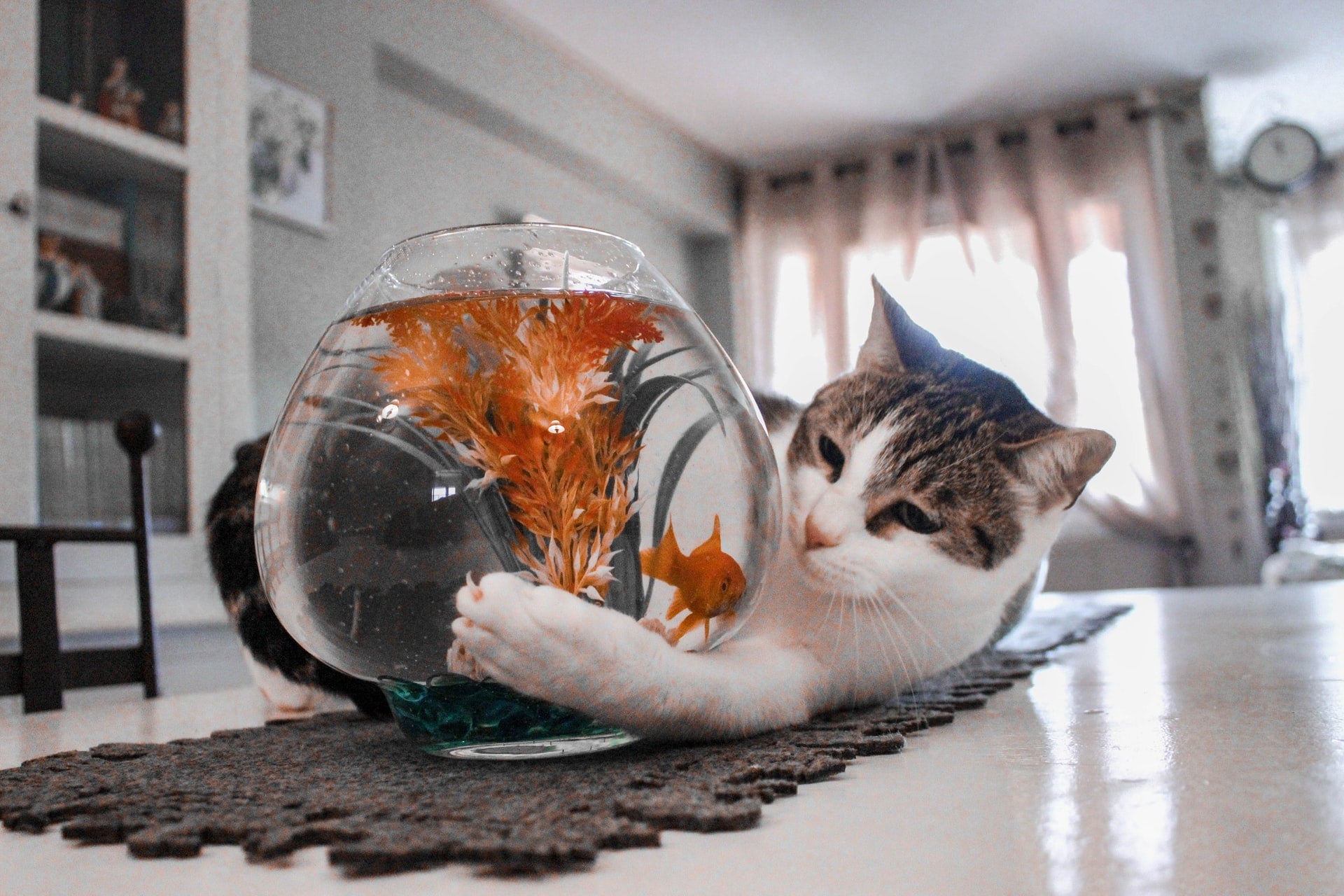Cats and fish go together like dogs and bones—they’re a well-known pair and a common cartoon trope, but there are quite a few precautions to take when giving your pet her favorite treat.
Should you be worried when your kitty climbs onto your kitchen counter during dinner prep to sneak a taste of raw fish? Is fish a good source of protein for your carnivorous cat? Keep reading to learn more!
Can Cats Eat Raw Fish?
Your kitty’s wild ancestors and cousins—lions, tigers, and bobcats—may be known to catch and eat fish straight out of a shallow stream, but this doesn’t mean it’s okay for your domestic cat to do the same.
In fact, raw fish can be incredibly dangerous for cats. As with any raw meat, there’s a risk of contamination from harmful bacteria such as salmonella and E. coli, which can cause food poisoning in humans and cats alike.
Additionally, raw fish contains an enzyme called thiaminase, which destroys the essential B vitamin thiamine. Over time, thiamine deficiency can lead to serious health issues, such as neurological problems.
It’s also important to note that, whether cooked or raw, fish bones are choking hazards and can even damage your kitty’s digestive tract.
Can Cats Eat Salmon?
With all of its omega-fatty acids and health-boosting vitamins, salmon offers your kitty a variety of health benefits including:
- Immune boost
- Weight management
- Metabolism support
- Skin health
Never give your cat raw salmon. Instead, make sure it’s cooked and doesn’t contain added salts, herbs, or spices. Avoid canned salmon or smoked salmon, too.
Additionally, don’t make salmon a staple of your cat’s diet as there are better protein sources to choose from. Offer it as an occasional treat instead.
Can Cats Eat Tuna?
As with any raw fish, avoid giving your cat raw tuna. Because tuna is a species that preys on other fish, it can be hard to know what types of toxins and heavy metals may have been consumed during its lifetime. If your kitty eats tuna as a staple in her diet, she may develop mercury poisoning.
That said, cats can have tuna as an occasional treat. Just make sure it’s cooked and doesn’t have too much added salt or oil.
Can Cats Eat Sardines?
You may not understand the appeal, but your cat might be a big fan of sardines. Plus. these tiny fish are packed with omega-3s, vitamin B12, and protein.
As with any fish, make sure to cook sardines before giving them to your cat, avoiding smoked sardines. Note that canned sardines may have particularly high levels of sodium, so they should be thoroughly rinsed before being cooked and served.
Can Cats Eat Anchovies?
Maybe you’re a fan of anchovies; maybe you ended up with some in your pantry and you’re looking for a way to get rid of them. Fortunately, anchovies are a great source of healthy fats and tend to contain less mercury and other toxins than their other fishy counterparts.
Because of their high fat content—and the fact that they’re typically preserved in oil—anchovies can contribute to feline weight gain. Be sure to rinse and drain anchovies as thoroughly as possible to remove excess fat and salt before giving them to your cat.
Can Cats Eat Shrimp?
Low in calories and high in protein, shrimp can be a great treat for cats. However, it’s also high in sodium and cholesterol, so it shouldn’t be a regular part of your kitty’s diet.
As with all fish, be sure to cook shrimp before giving it to your cat, avoiding added oil, salt, or seasonings. It’s also a good idea to remove the tail before giving it to your cat, as this could be a choking hazard and could even contain toxins.
Benefits of Fish Oil for Cats
Fish oil is known as a superfood for humans and pets alike, and cats are certainly not the exception. Rich in omega fatty acids, fish oil is a great supplement to support your cat’s skin and coat, joints, and overall health.
If you would rather not deal with the hassle of preparing fish for your cat (and worrying about her dragging it off of your counter before it’s cooked), you can skip the fish altogether in favor of commercially available fish oil supplements.
Take PetHonesty’s Wild Alaskan Salmon Oil for Cats, for example. Made with sustainably caught salmon off the coast of Alaska, this wild Alaskan salmon oil contains EPA, DHA, and omega-3s that support your cat’s joints, heart, skin, coat, brain, and overall health. Plus, the tasty fish flavor makes a great addition to your cat’s food—just pump it directly into your cat’s food bowl and mix well.
Sources:
https://blog.petcube.com/can-cats-eat-fish/
https://pets.webmd.com/cats/ss/slideshow-foods-your-cat-should-never-eat
https://www.litter-robot.com/blog/can-cats-eat-tuna-raw-fish-sushi-salmon/
https://www.timeforpaws.co.uk/s/5-human-foods-that-are-good-for-cats














